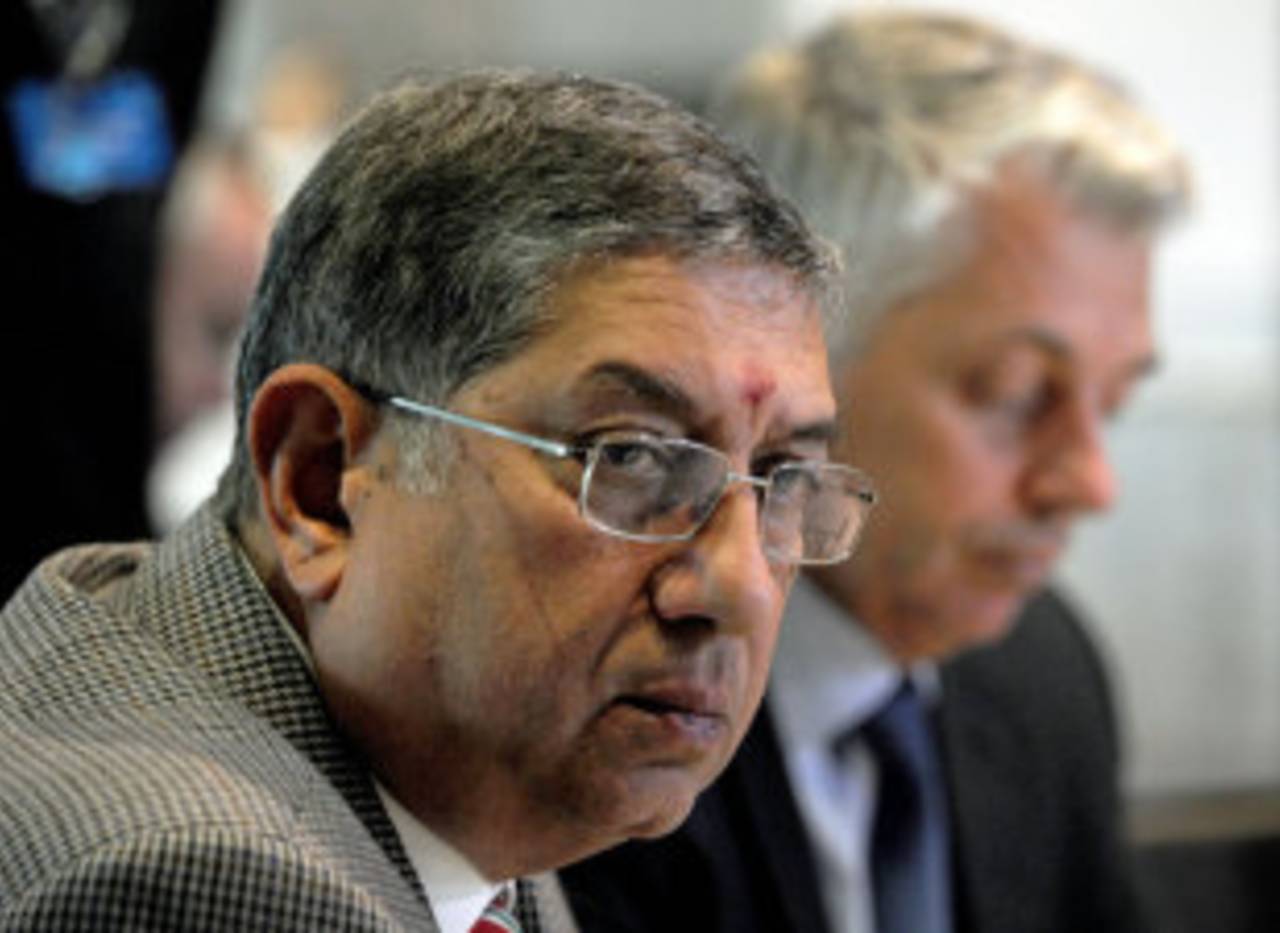BCCI rules not 'sacrosanct', says Supreme Court
The Supreme Court has asked the BCCI to make information available on which "administrators", as defined by their rules, would be affected should the clause permitting board officials to have a commercial interest in the IPL and the CLT20 be struck down
ESPNcricinfo staff
16-Dec-2014

The hearings in the IPL 2013 corruption case are now looking into constitutional amendments that allowed N Srinivasan's company, India Cements, to own a franchise • AFP
The Supreme Court has asked the BCCI to make information available on which "administrators", as defined by their rules, would be affected should the clause permitting board officials to have a commercial interest in the IPL and the CLT20 be struck down.
The hearings regarding the IPL 2013 corruption case have moved from the findings of the Mudgal committee to the BCCI's internal functioning, as well as the constitutional amendments that led to the ownership of a franchise being awarded to India Cements, owned by N Srinivasan, currently the BCCI's sidelined president. Srinivasan was the board treasurer when the Chennai Super Kings franchise was purchased by India Cements.
The BCCI's counsel CA Sundaram had originally divided the BCCI's functioning into two parts: one pertaining to first-class and international cricket, and the IPL which "was in a different class of its own" and served a distinct commercial function. The two-man bench of the Supreme Court, comprising Justice TS Thakur and Justice FM Kalifullah asked Sundaram about whether any BCCI administrator, apart from Srinivasan, owned an IPL team. The response was no and the bench went on to say that the format of the IPL did not "depend" on an administrator owning a team and would not "collapse" should the clause 6.2.4 go back to its original form. Sundaram was also asked whether the board could not have found an eighth buyer outside the BCCI if seven other buyers "could be found" for the IPL franchises in 2007.
The bench was also direct in its response to the BCCI's argument of falling under the "legislation and powers" of the Tamil Nadu Societies Registration Act, in which all two-party disputes could be internally settled and did not require any external intervention. The external intervention was a reference to the involvement of the litigants' Cricket Association of Bihar in the IPL corruption case.
The bench did not accept this and told the BCCI: "Your rules may be sacrosanct for you but not for us. You should take that off your mind that the court is powerless."
The bench went on to advise BCCI counsel that any attempt to "limit" the Supreme Court's jurisdiction "doesn't take you anywhere." Justice Thakur said the court was exercising its authority in the case "not to promote your or any other person's cause, it is to promote the purity if the game." The BCCI was told: "If you want clause 6.2.4 to be saved, please satisfy us."
The board assured the court that "some" of its functions could be defined as public ones. When asked to list those functions, Sundaram said, "Sending out a team, selecting a team, calling it team India, offering players opportunities to play, barring players from discharging these opportunities because of a rule violation." Going by that definition, the bench said, "millions" of people believed in the assumption that a game they were viewing was fair. The bench said, "If you falter in that, you are answerable to us." Justice Thakur then asked, "How fair is it to have somebody as an administrator of the BCCI and to have a team?"
Earlier in the hearing, Rajeev Dhawan, counsel for IS Bindra whose intervention concluded on Tuesday, said the ongoing case was "not the case of a Masonic lodge or a co-operative society." He said that the BCCI's argument of autonomy should "not stand in the way of the public interest" and if it happened the work of the Court-appointed Mudgal Committee would come to naught.
There will be hearings on Wednesday morning and Thursday afternoon during which all concerned parties are expected to conclude their arguments. The court will then break for vacation for the next two weeks, leading to the possibility that final orders from the court in the IPL 2013 corruption case are likely to emerge only in the new year.